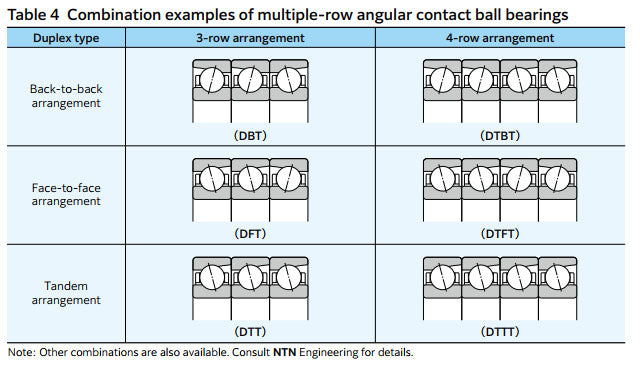Description
NTN 7028
Single Angular Contact Ball Bearing - Open Type
SPECIFICATIONS
| 140 mm, 5.5118 in |
| 210 mm, 8.2677 in |
| 33 mm, 1.2992 in |
| 30 ° |
| Open |
| High Strength, 2 piece, Machined |
| Round |
| High Carbon Chrome Steel |
| Brass |
| 8482.10.5028 |
| 1.2992 in; 33.000 mm |
| 33.000 mm, 1.2992 in |
| One |
| 3100 rpm |
| 4100 rpm |
| ISO Class 0 |
| 2.000 mm, 0.0787 in |
| 27000 lbf |
| 29900 lbf |
| 4547359435542 |
Angular Contact Ball Bearings

1. Design features and characteristics
1.1 Angular contact ball bearing
Angular contact ball bearings are non-separable bearings with a defined contact angle in the radial direction relative to the straight line that runs through the point where each ball makes contact with the inner and outer rings (see Fig. 1). Table 1 provides information on contact angles and their designated codes.
In addition to radial loads, angular contact ball bearings can accommodate single direction axial loads. Since an axial load is generated from a radial force, these bearings are generally used in pairs. Table 2 shows general angular contact ball bearing characteristics, Table 3 shows information on using duplex (side by side) angular contact ball bearings, and Table 4 shows information on multiple-row angular contact ball bearings.
For bearings with a contact angle of 15° and bearing tolerance JIS Class 5 or higher, see special catalog “Precision rolling bearings (CAT. No. 2260/E)”.




1.2 Four-point angular contact ball bearings
Four-point angular contact ball bearings have a contact angle of 30° and a split inner ring. As shown in Fig. 2, when the inner and outer rings receive a radial load, the ball contacts the inner and outer rings at four points. This construction enables a single bearing to accommodate axial loads from either direction, and when under a simple axial load or heavy axial load, the bearing relies on two contact points like ordinary bearings.

1.3 Double row angular contact ball bearings
The structure of double row angular contact ball bearings is designed by arranging two single row angular contact bearings back-to-back in duplex (DB) to form a single bearing with a contact angle of 25°.
These bearings are capable of accommodating radial loads, axial loads in either direction, and have a high capacity for moment loads.
As shown in Fig. 4, sealed and shielded type double row angular contact ball bearings are also available. Standard loads vary from those of open type bearings.


